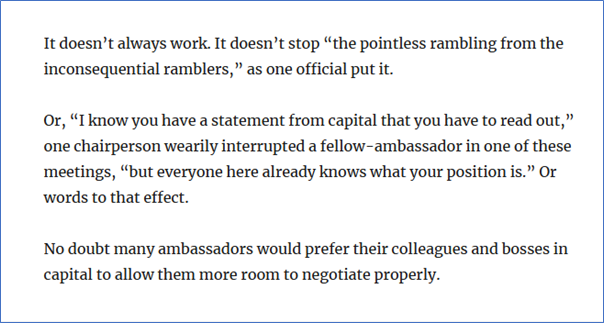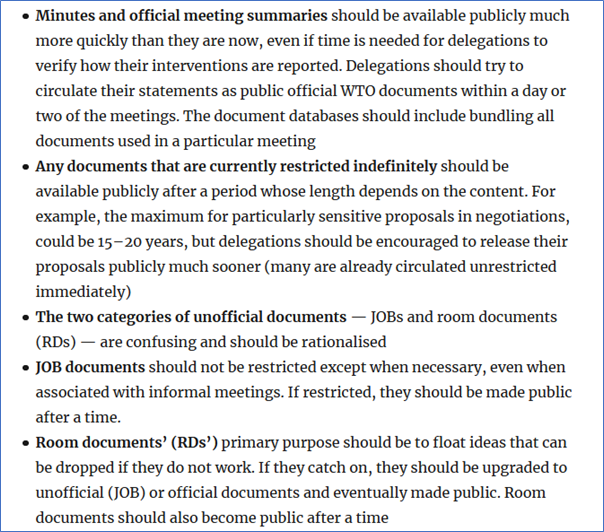RECAP, IN A THREAD—TRADE TRANSPARENCY
1/17 THE MEANING isn’t so clear
With the clamour for reform, #WTOtransparency needs re-examining. @wto and its members should do better
A 4-part analysis with @BobWolfeSPS (+ great photos by @JayLouvion) #WTOreform
tradebetablog.wordpress.com/2021/04/26/wto…
1/17 THE MEANING isn’t so clear
With the clamour for reform, #WTOtransparency needs re-examining. @wto and its members should do better
A 4-part analysis with @BobWolfeSPS (+ great photos by @JayLouvion) #WTOreform
tradebetablog.wordpress.com/2021/04/26/wto…

2/17 Should @wto members pay more attention to external transparency?
Our recommendations are in tweet 16. Our reasons are in the rest of this thread, and the linked pieces.
#WTOtransparency #WTOreform
SHORT VERSION: tradebetablog.wordpress.com/2021/04/26/wto…
Our recommendations are in tweet 16. Our reasons are in the rest of this thread, and the linked pieces.
#WTOtransparency #WTOreform
SHORT VERSION: tradebetablog.wordpress.com/2021/04/26/wto…
3/17 TRANSPARENCY
A WTO aim—reliable info about governments’ rules and practices reduces uncertainty about trade.
Also makes taxpayers’ money accountable.
But *occasionally* too much public info can impede work in the WTO
#WTOtransparency #WTOreform
tradebetablog.wordpress.com/2021/04/26/wto…
A WTO aim—reliable info about governments’ rules and practices reduces uncertainty about trade.
Also makes taxpayers’ money accountable.
But *occasionally* too much public info can impede work in the WTO
#WTOtransparency #WTOreform
tradebetablog.wordpress.com/2021/04/26/wto…

4/17 NOT about “comms”.
Pure TRANSPARENCY = straight information
ADVOCACY = stressing the positive
SPIN = manipulative, not always honest—suspect, undermining support
PROMOTING the WTO and DG = Useful? Or a distraction?
#WTOtransparency #WTOreform
tradebetablog.wordpress.com/2021/04/26/wto…
Pure TRANSPARENCY = straight information
ADVOCACY = stressing the positive
SPIN = manipulative, not always honest—suspect, undermining support
PROMOTING the WTO and DG = Useful? Or a distraction?
#WTOtransparency #WTOreform
tradebetablog.wordpress.com/2021/04/26/wto…
5/17 EXTERNAL TRANSPARENCY
A large amount of WTO information (news, docs, data) is already public, mainly through the website
But members treat it as an afterthought, a nuisance. More/better public info should be part of #WTOreform.
#WTOtransparency
tradebetablog.wordpress.com/2021/04/26/wto…
A large amount of WTO information (news, docs, data) is already public, mainly through the website
But members treat it as an afterthought, a nuisance. More/better public info should be part of #WTOreform.
#WTOtransparency
tradebetablog.wordpress.com/2021/04/26/wto…
6/17 With 164 members @wto leaks like the proverbial sieve
The Secretariat AND member governments are responsible for WTO info. But what is the division of labour? Are there biases? Secrecy and leaks arouse suspicion
#WTOtransparency #WTOreform
tradebetablog.wordpress.com/2021/04/26/wto…
The Secretariat AND member governments are responsible for WTO info. But what is the division of labour? Are there biases? Secrecy and leaks arouse suspicion
#WTOtransparency #WTOreform
tradebetablog.wordpress.com/2021/04/26/wto…

7/17 Diverse audience: citizens, lawyers, academics, think-tankers, lobbyists, activists, journalists, politicians, business & industry associations, companies’ trade specialists. The media, NGOs are less interested now.
#WTOtransparency #WTOreform
tradebetablog.wordpress.com/2021/04/26/wto…
#WTOtransparency #WTOreform
tradebetablog.wordpress.com/2021/04/26/wto…

8/17 WTO openness is inconsistent—agendas, minutes, proposals/drafts, document categories, website news.
Publicly available texts aren’t always transparent. Dispute rulings are public but incomprehensible legalese.
#WTOtransparency #WTOreform
tradebetablog.wordpress.com/2021/04/26/wto…
Publicly available texts aren’t always transparent. Dispute rulings are public but incomprehensible legalese.
#WTOtransparency #WTOreform
tradebetablog.wordpress.com/2021/04/26/wto…

9/17 Public info is essential for public support. Secrecy arouses suspicion. Leaking worsens suspicion, and is biased. Leakers have an agenda. They leak to people who help push the agenda. Secretariat info is more neutral.
#WTOtransparency #WTOreform
tradebetablog.wordpress.com/2021/04/26/wto…
#WTOtransparency #WTOreform
tradebetablog.wordpress.com/2021/04/26/wto…
10/17 NEGOTIATIONS
Why does the fisheries subsidies chair hold meetings in triplicate—3 on each subject with identical agendas?
FACT: Countries do not negotiate in meetings of the full membership, even behind closed doors
#WTOtransparency #WTOreform
tradebetablog.wordpress.com/2021/04/26/wto…
Why does the fisheries subsidies chair hold meetings in triplicate—3 on each subject with identical agendas?
FACT: Countries do not negotiate in meetings of the full membership, even behind closed doors
#WTOtransparency #WTOreform
tradebetablog.wordpress.com/2021/04/26/wto…
11/17 Small, private meetings are needed for real give-and-take. Otherwise negotiators go outside the WTO, even talking directly in capitals. They do already
This has implications for how negotiations are organised and #WTOtransparency #WTOreform
tradebetablog.wordpress.com/2021/04/26/wto…
This has implications for how negotiations are organised and #WTOtransparency #WTOreform
tradebetablog.wordpress.com/2021/04/26/wto…

12/17 When it works, it delivers.
But grandstanding can still happen in small meetings
Now, in 2021, the configurations have become more cumbersome. This affects ministerial conferences, and negotiations meetings in Geneva.
#WTOtransparency #WTOreform
tradebetablog.wordpress.com/2021/04/26/wto…
But grandstanding can still happen in small meetings
Now, in 2021, the configurations have become more cumbersome. This affects ministerial conferences, and negotiations meetings in Geneva.
#WTOtransparency #WTOreform
tradebetablog.wordpress.com/2021/04/26/wto…

13/17 DOES TRANSPARENCY HELP OR HINDER?
The evidence is at best contradictory. There are two sides to this coin. One is legitimacy through public support. The other is negotiating efficiency, the ability to reach agreement.
#WTOtransparency #WTOreform
tradebetablog.wordpress.com/2021/04/26/wto…
The evidence is at best contradictory. There are two sides to this coin. One is legitimacy through public support. The other is negotiating efficiency, the ability to reach agreement.
#WTOtransparency #WTOreform
tradebetablog.wordpress.com/2021/04/26/wto…
14/17 To be transparent or not to be? That is not the question. It’s what is “too much”? When/how does it make a difference?
Timing is key. Some parts of a negotiation can be kept confidential, but only for a limited period.
#WTOtransparency #WTOreform
tradebetablog.wordpress.com/2021/04/26/wto…
Timing is key. Some parts of a negotiation can be kept confidential, but only for a limited period.
#WTOtransparency #WTOreform
tradebetablog.wordpress.com/2021/04/26/wto…

15/17 But in the end whatever is agreed and how that agreement developed should be made public.
It doesn’t say much about democratic processes if a deal can only be ratified when the public is kept partly in the dark.
#WTOtransparency #WTOreform
tradebetablog.wordpress.com/2021/04/26/wto…
It doesn’t say much about democratic processes if a deal can only be ratified when the public is kept partly in the dark.
#WTOtransparency #WTOreform
tradebetablog.wordpress.com/2021/04/26/wto…

16/17 Our proposals include: rethink WTO documents, more openness with agendas/minutes, members to make more negotiating proposals public, release all chairs’ draft texts, explain dispute rulings for a broader public.
#WTOtransparency #WTOreform
tradebetablog.wordpress.com/2021/04/26/wto…



#WTOtransparency #WTOreform
tradebetablog.wordpress.com/2021/04/26/wto…




17/17 All of this began with a Twitter exchange about advice for new recruits.
We might agree with “pick up the phone” when a reporter calls. But we would add: “Don’t answer the question. Pass the call to someone who can”.
#WTOtransparency #WTOreform
tradebetablog.wordpress.com/2021/04/26/wto…
We might agree with “pick up the phone” when a reporter calls. But we would add: “Don’t answer the question. Pass the call to someone who can”.
#WTOtransparency #WTOreform
tradebetablog.wordpress.com/2021/04/26/wto…
• • •
Missing some Tweet in this thread? You can try to
force a refresh








